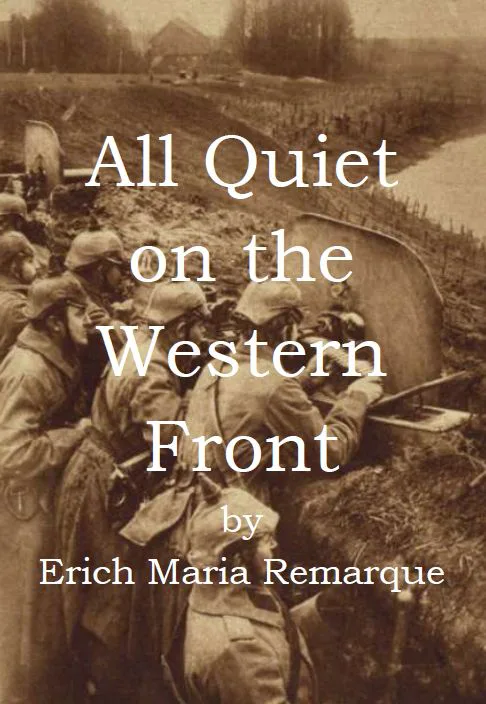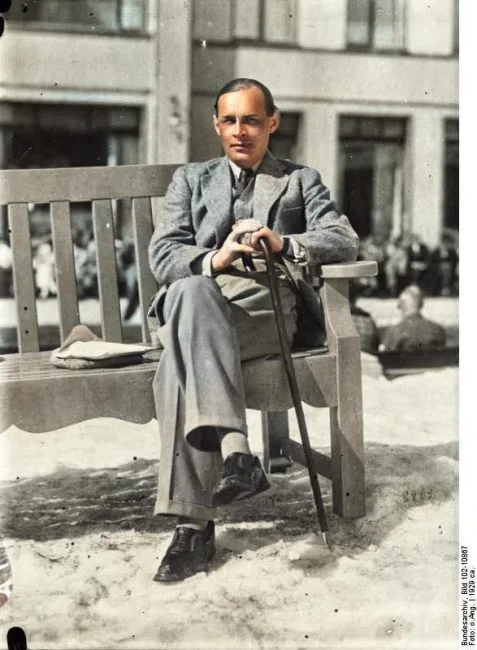
It took me a while to read “All Quiet on the Western Front” by Erich Maria Remarque, but I’m glad I finished and experienced it. It is deeply moving and well-written novel. Published in the late 1920s, it deals with the profound and lasting impact of war on soldiers. The book, surely, is out in its genre for its powerful portrayal of the effects of war.
The ideas within the book continue to resonate with readers today, regardless of the passage of time. It’s the best war novel I’ve ever read! Although I haven’t read a ton of war novels, I’m not sure if that’s a reflection of my reading choices or just how outstanding this book is. Anyway, let’s dive into the plot!
The Plot
The story is narrated by Paul Bäumer, the protagonist, who is a nineteen-year-old high school graduate. Along with his entire class, he enlists in the military to fight for Germany in World War I.
As the plot progresses, Paul introduces us with his group of soldiers. Reminiscing about the past, he explains how they decided to enlist after hearing the glorious talk about war and country from their old schoolmaster. However, the glorious aspect of war is not real, says Paul. Constant bombardments and enemy infantry assaults, combined with the lifeless bodies that he and his group witness, dilute all their sense of hope and humanity.
“We’re no longer young men. We’ve lost any desire to conquer the world. We are refugees. We are fleeing from ourselves. From our lives. We were eighteen years old, and we had just begun to love the world and to love being in it; but we had to shoot at it. The first shell to land went straight for our hearts. We’ve been cut off from real action, from getting on, from progress. We don’t believe in those things any more; we believe in the war.” Pg67
In between, Paul is granted leave, and with a mixture of relief and apprehension, he returns home for fourteen days to see his family. Part of him hopes that the comforting embrace from his family members might ease his pain, but this feeling is marred by the sight of his ailing mother.
For him, his home, which once radiated warmth and security, feels unfamiliar and alien. The peace and quiet only amplify his sense of isolation and disconnection. He yearns to reclaim the past familiarity and tranquillity but then he realises that he has been irrevocably altered by the horrors he has witnessed. The innocence and simplicity of his pre-war life are now replaced with melancholy and scars of war.
Paul contemplates the impact of the war on his generation and their place in history, considering it an unnecessary tragedy. He then faces an existential dilemma. Reflecting on his generation, he feels that it has been entirely consumed by military conflict. And eventually nothing will come out of it.
His position, during wars, largely stays in the front lines. He is wounded though, but then after medical leave, he resumes to the front lines again. He witnesses his friends’ deaths, until he becomes the sole surviving member of his group. Ironically, on the day of peace along the entire Western Front, Paul is killed, which totally highlights the senselessness and randomness of war.
“He fell in October 1918, on a day that was so quiet and still on the whole front, that the army report confined itself to the single sentence: All quiet on the Western Front.
He had fallen forward and lay on the earth as though sleeping. Turning him over one saw that he could not have suffered long; his face had an expression of calm, as though almost glad the end had come.”
The Lingering Shadows of War
This novel provides a vivid portrayal of the terrifying realities of World War I from the perspective of ordinary soldiers. War doesn’t simply end when the battle is over, rather, it stays long after the fighting has ended, deeply affecting the soldiers.
“We forget nothing really. But so long as we have to stay here in the field, the front-line days, when they are past, sink down in us like a stone; they are too grievous for us to be able to reflect on them at once. If we did that, we should have been destroyed long ago. I soon found out this much:–terror can be endured so long as a man simply ducks;—but it kills, if a man thinks about it”. Pg86
Every now and then, in the plot development, I found myself emotional and deeply moved by the characters’ struggles. Some of these impactful parts include:
- Paul Bäumer’s Return Home: During his leave, Paul finds it difficult to reconnect with his family and adjust to normal life. This highlights the profound alienation and emotional distance caused by war.
- Shell Hole Episode: In one memorable scene, Paul shares a shell hole with Gérard Duval, a French soldier. This moment underscores the shared humanity between enemies and the brutal reality of war.
- The Ending: The final scene of the book was the most impactful and continued to resonate with me long after I finished reading.
Unmasking the Brutality of War
Remarque replaces the romanticized view of glory and heroism with a starkly unromantic depiction of fear, futility, and slaughter, vividly illustrating the harsh and brutal realities faced by soldiers on the front lines. With an unyielding focus on the physical and psychological damage that becomes the “side effects” of war, Remarque portrays the profound and lasting impact on soldiers, exposing the true cost of combat beyond the battlefield.
“Continuous fire, defensive fire, curtain fire, trench mortars, gas, tank, machine-guns, hand-grenades – words, words but they embrace all the horrors of the world” pg96
The author has been successful in balancing the equation on the other side as well. Specifically, the profound emotional suffering experienced by soldiers, which is difficult for those who haven’t been through war to fully understand. This disconnect is highlighted through an interaction between Paul Bäumer and his mother when he returns home on leave.
“Suddenly my mother grips my hand and asks hesitantly, “Was it very bad out there, Paul?”. Mother what kind of answer can I give you? You won’t understand and never will. And I don’t want you to”. pg115
The true nature of war is best understood by soldiers. While civilians, like us and those depicted in the book, may try to comprehend it, experiencing it firsthand on the battlefield is vastly different. Remarque does an excellent job of illustrating this distinction. Through his writing, he paints an accurate picture of the battlefield, allowing civilians to see and understand what soldiers experience, as we see below:
“We see men go on living with the top of their skull missing; we see soldiers go on running when both their feet have been shot away – they stumble on their splintering stumps to the next shell hole.
One lance-corporal crawls for a full half mile on his hands, dragging his legs behind him, with both knees shattered. Another man makes it to a dressing station with his guts spilling out over his hands as he holds them in. we see soldiers with their mouths missing; we find someone who has gripped the main artery in his arm between his teeth for two hours so that he doesn’t bleed to death. The sun goes down, night fall, the shells whistle, life comes to an end”. Pg97.

Takeaway
Throughout the book, there is a sense of intense emotional depth. This intensity, I feel, creates an immersive effect. Remarque’s own experiences in World War I—fighting at Passchendaele and being wounded—further lend authenticity to his portrayal of the war’s brutal realities.
The struggles, fears, and disillusionments experienced by these young soldiers resonate with readers across times. These universal themes make “All Quiet on the Western Front” relevant to anyone who seeks to understand the human condition and the impact of war. And because of this, I feel, the book will continue to remain relevant in the future as well.
Some questions that stay with the reader after finishing the book will be about the nature of war and its broader implications, like:
- What does it truly mean to be patriotic, and how does it justify the sacrifices made in war?
- What constitutes real bravery in the context of war, and how is it perceived by those involved and by society?
- What is the ultimate purpose or value of the ongoing violence and killing in war?
- Why do people fight and die for causes or ideals that seem indifferent to their personal suffering?
- Why are those in power often unyielding or unresponsive to the sacrifices made by others?
Like Paul’s interaction with his mother, the novel leaves these questions unanswered.
I would encourage anyone who hasn’t read “All Quiet on the Western Front” yet to check it out. From my perspective, it’s a powerful and thought-provoking book that offers a profound exploration of the realities of war.



